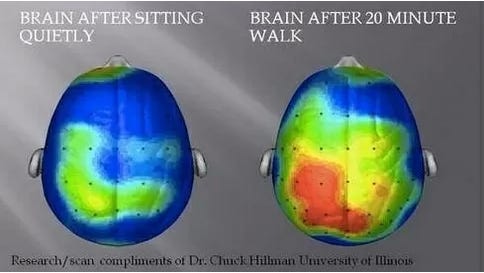Missing a Muse? Start Walking.
Movement drives up to 81% more creative thinking
The average American spends 6.5 hours a day sitting. Teenagers spend 8 hours a day sitting. Officer workers, even in 2019 before remote work “freed” us, sat an average of 15 hours a day. If we’re sleeping eight hours a day, that leaves a single precious hour for human movement. The conclusion is clumsily this: Knowledge workers are willfully dissolving into the economy of their own making. Mobility is the antithesis to the metaverse.
As a 2014 study found, when compared to stationary sitting:
Walking or rolling in a wheelchair increased creative abilities for 81% ... the average participant increasing creative output by around 60%.
Movement allows ideas to flow freely, as participants were more talkative compared to sitting, and more of their talk included creative notions. It is also possible that the act of walking contributes to divergent thinking because walking triggers thoughts of moving from one idea to the other. Mood is another potential factor since physical exercise is directly correlated to mood enhancement through endorphin release. A positive mood boost might in turn improve novel thinking, however, other research has shown that negative emotions can lead to increased artistic creativity.
In all the elation of a remote workforce and the destruction of the office, it might be worth thinking of the commute as a physical ritual of innovation. At the very least, we must not forget that movement is momentum not only for the body, but the brain.
Sitting causes:
MRI scans back this up: compare brain activity while sitting versus brain activity after walking for twenty minutes. Even headline grazers such as myself can recognize the results: a sitting brain doesn’t even have red patches!
Authors have always known that walking leads to paradise: Charles Dickens once said:
The sum of the whole is this: Walk and be happy; Walk and be healthy.
Want to be a Super Man or Super Person? Start walking. According to Friedrich Wilhelm Nietzsche:
Only those thoughts that come by walking have any value.
William Wordsworth (1770-1850), the wimpiest purveyor of Romanticism, would be ashamed of the immobility of modernity. Scholars estimate that he walked 180,000 miles in his lifetime. In walking, we may find a lifetime. As Wordsworth puts it in “Sweet Was the Walk:”
Sweet was the walk along the narrow lane
At noon, the bank and hedge-rows all the way
Shagged with wild pale green tufts of fragrant hay,
Caught by the hawthorns from the loaded wain,
Which Age with many a slow stoop strove to gain;
And childhood, seeming still most busy, took
His little rake; with cunning side-long look,
Sauntering to pluck the strawberries wild, unseen.
Now, too, on melancholy’s idle dreams
Musing, the lone spot with my soul agrees,
Quiet and dark; for through the thick wove trees
Scarce peeps the curious star till solemn gleams
The clouded moon, and calls me forth to stray
Thro’ tall, green, silent woods and ruins grey.
If necessity is the mother of invention and walking inspires the innovation of our inventions, sitting is the stew of stagnation.
Stuck on a project? Blocked on a decision? Depressed and drowning in routine?
Own your reality in two easy steps:
Go for a walk.
Leave your phone behind.
Become the motion, not the moment.




I took more long walks during the first year of pandemic than I ever had before...and I wrote a novel. Haven't walked nearly as much since. Hmmmm
So true. And it's a shame that so much of American city planning is hostile to pedestrians...